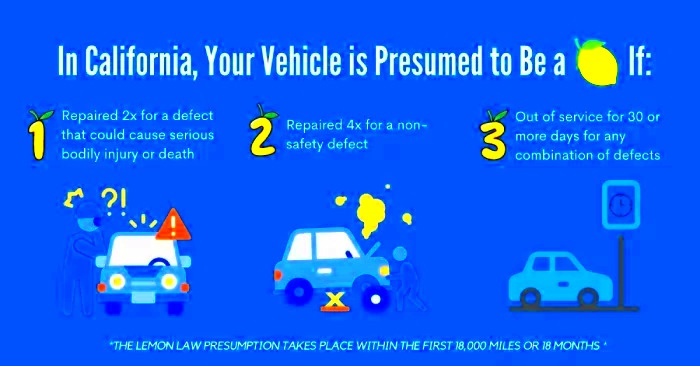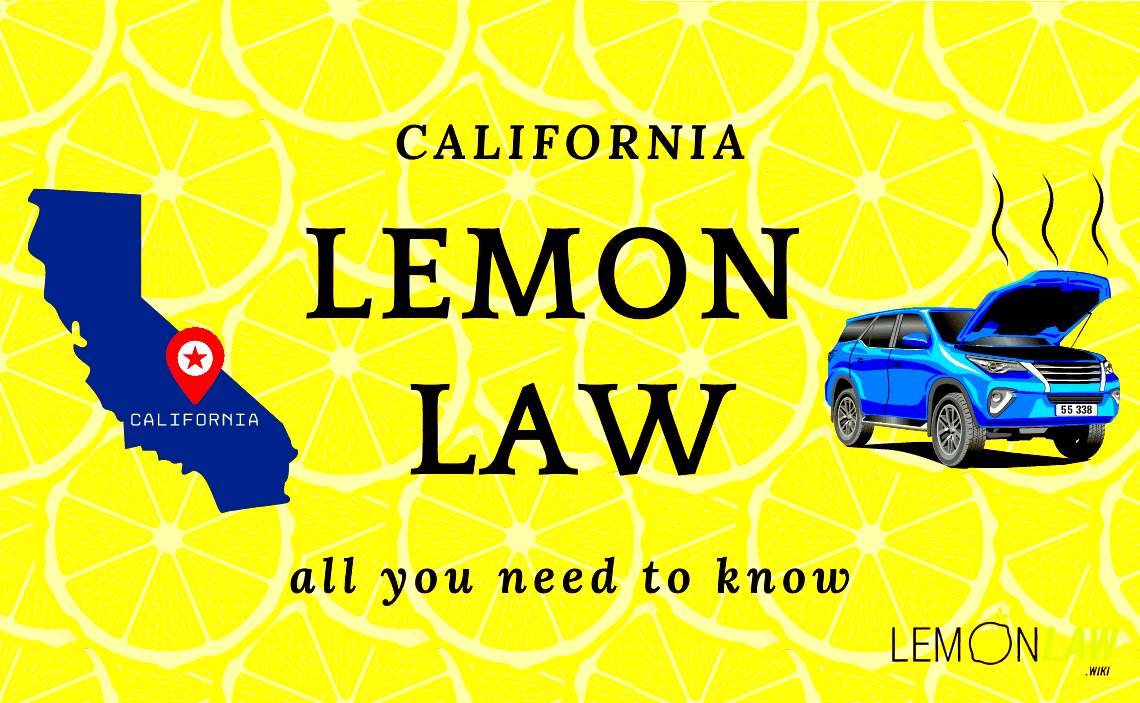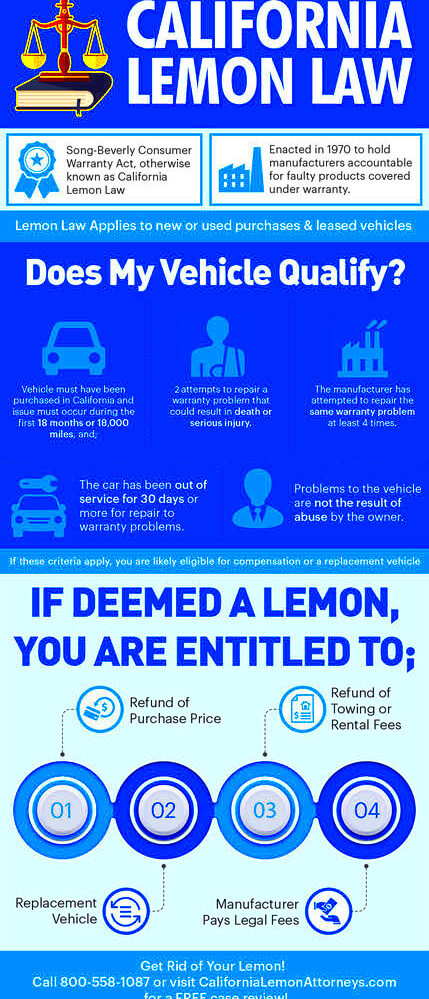California Lemon Law After 18 Months: What to Know
The California Lemon Law is designed to protect consumers who purchase or lease defective vehicles. It provides a way for buyers to seek remedies if they receive a vehicle that has serious defects. This law ensures that manufacturers uphold their responsibility to provide safe and reliable vehicles. If your car has persistent issues despite multiple repair attempts, it may qualify as a “lemon.” The law applies to both new and used cars, but specific conditions must be met for a claim to be valid.
Eligibility Criteria for Lemon Law Claims

To qualify for a Lemon Law claim in California, several criteria must be met:
- Vehicle Type: The law applies to passenger cars, vans, and SUVs. Motorhomes and trucks may also qualify under certain circumstances.
- Defect: The vehicle must have a defect that significantly impairs its use, safety, or value.
- Repair Attempts: The manufacturer or dealer must have had a reasonable opportunity to repair the defect, typically at least two to four attempts, depending on the severity.
- Timeframe: The defect must occur within the warranty period or within 18 months of purchase, whichever comes first.
If you think your vehicle meets these criteria, it’s important to gather documentation of repair attempts and any communication with the manufacturer or dealer.
Timeframe for Filing a Lemon Law Claim

The timeframe for filing a Lemon Law claim in California is crucial. Generally, you must initiate your claim within 18 months from the date of purchase or lease. However, keep in mind:
- Warranty Period: Claims are typically valid during the warranty period of the vehicle. If your vehicle is still under warranty and you experience defects, this strengthens your claim.
- Repair Documentation: Ensure you have records of all repair attempts, including dates and descriptions of the issues. This information is vital for your claim.
- Legal Action: If the manufacturer does not resolve the issue, you may need to consider legal action. Consulting with a Lemon Law attorney can provide guidance on this process.
Acting quickly is essential to protect your rights under the Lemon Law. Keeping track of deadlines and required documentation can make the process smoother and help you achieve a satisfactory resolution.
What Happens After 18 Months
Once the 18-month mark passes, you might wonder what your options are if your vehicle continues to have issues. California’s Lemon Law does have specific timeframes, but that doesn’t mean you are entirely out of luck if problems persist after this period. Here’s what to consider:
- Warranty Coverage: If your vehicle is still under warranty, you may still be eligible for repairs or replacements. It’s essential to review the terms of your warranty to understand your rights.
- Continued Issues: If defects remain unresolved after the warranty expires, you may still have some recourse. Document any ongoing issues as they may indicate the vehicle is still problematic.
- Other Legal Avenues: After 18 months, pursuing a Lemon Law claim may become more complicated. However, you can explore other legal options like breach of warranty claims or consumer protection laws.
In such cases, consulting with a Lemon Law attorney is beneficial. They can evaluate your situation and advise you on the best steps to take to ensure you receive fair treatment.
Common Issues Covered Under Lemon Law
California Lemon Law covers a range of defects that can make a vehicle unsafe or unreliable. Here are some common issues:
- Engine Problems: This includes stalling, overheating, or failure to start.
- Transmission Issues: Difficulties in shifting gears or unusual noises can indicate transmission defects.
- Brake Failures: If your brakes are not functioning correctly, this poses a significant safety risk.
- Electrical System Failures: Issues like malfunctioning lights, dead batteries, or problems with the car’s computer systems fall under this category.
- Defective Tires: Problems with the tires can impact safety and handling, making them a serious concern.
If you experience any of these issues, it’s crucial to document them thoroughly. This documentation will be vital in building your Lemon Law case.
Steps to Take if Your Vehicle is a Lemon
If you suspect that your vehicle is a lemon, taking the right steps can help you navigate the situation smoothly. Here’s a simple guide:
- Document Everything: Keep records of all repairs, including dates, descriptions, and any correspondence with the dealer or manufacturer.
- Contact the Dealer: Notify the dealer about the issues you’re facing. They may offer to resolve the problem under warranty.
- Request a Buyback or Replacement: If repairs are unsuccessful, you can formally request a buyback or replacement vehicle from the manufacturer.
- Consult an Attorney: If the dealer or manufacturer doesn’t respond positively, it’s time to consult a Lemon Law attorney. They can provide legal guidance and help you file a claim.
- File a Claim: If necessary, you can file a formal Lemon Law claim. Be sure to include all documentation to support your case.
Acting quickly and effectively can lead to a favorable outcome. Remember, you have rights as a consumer, and you deserve a vehicle that functions properly.
Consulting with a Lemon Law Attorney
If you find yourself struggling with a lemon vehicle, consulting with a Lemon Law attorney can make a significant difference. These legal professionals specialize in helping consumers navigate the complexities of Lemon Law claims. Here are some key points to consider when seeking legal assistance:
- Experience Matters: Look for an attorney who has specific experience with Lemon Law cases. They’ll be familiar with the nuances of the law and how to approach your situation effectively.
- Initial Consultation: Many attorneys offer a free initial consultation. Use this opportunity to discuss your case, ask questions, and determine if the attorney is a good fit for you.
- Fee Structure: Understand the attorney’s fee structure before proceeding. Some Lemon Law attorneys work on a contingency basis, meaning they only get paid if you win your case.
- Document Review: A good attorney will help you review all relevant documentation. They’ll ensure you have a strong case by examining your repair records and any communication with the manufacturer.
- Representation: Having an attorney represent you can help level the playing field against powerful car manufacturers. They’ll negotiate on your behalf and work to secure the best possible outcome.
Consulting with a Lemon Law attorney is a proactive step that can provide you with peace of mind and clarity in a challenging situation.
FAQ
Here are some frequently asked questions regarding California Lemon Law:
- What is a lemon vehicle? A lemon vehicle is one that has a significant defect affecting its use, safety, or value, which has not been resolved after multiple repair attempts.
- How long do I have to file a claim? You generally have 18 months from the date of purchase or lease to file a Lemon Law claim.
- Can I sue the manufacturer directly? Yes, you can sue the manufacturer, but it’s often advisable to consult with an attorney first.
- What kind of compensation can I receive? You may be entitled to a refund, replacement vehicle, or coverage for repairs and legal fees, depending on your situation.
- Do I need an attorney to file a claim? While it’s not required, having an attorney can significantly increase your chances of a successful outcome.
Conclusion
Understanding California Lemon Law is essential for any consumer facing vehicle issues. By knowing your rights and the steps to take, you can effectively navigate the complexities of a Lemon Law claim. Whether you’re dealing with persistent defects or considering legal action, remember that help is available. Consulting with a knowledgeable Lemon Law attorney can provide valuable guidance and increase your chances of a successful resolution. Always document your vehicle’s problems and keep detailed records of repairs, as this information will be crucial in supporting your case. You deserve a vehicle that meets safety and performance standards, so don’t hesitate to take action if you think you have a lemon.


